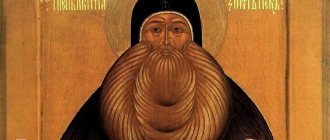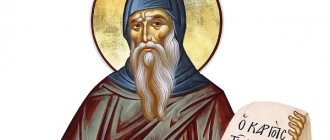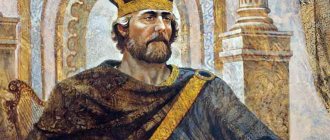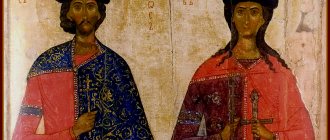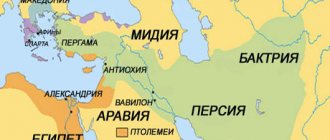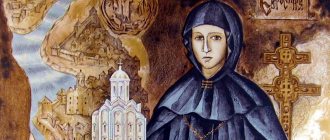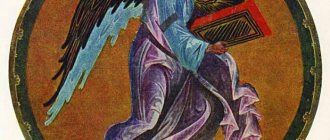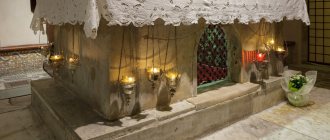February 3 (January 21, Old Style) The church honors the memory of St. Maxim the Greek , one of the most famous saints among the Old Believers. The life of St. Maxim stands apart, as it were, in comparison with other hagiographies: here, in contrast to the traditional tale of the ascetic exploits of Russian monastic hermits and desert dwellers, we see a description of an unyielding moral struggle, as well as a special feat of patience in exile and severe hardships, for the sake of confession truth.
Reverend Maxim the Greek
If the biography of this saint is compared with an adventure novel, perhaps the closest thing to it in terms of plot twist will be Dumas’s “The Count of Monte Cristo.” But the outcome of the story is different: this is a fascinating story about how a highly educated intellectual of the Renaissance, having traveled to many cultural centers of Europe in search of truth, having gone through the school of Catholic monasticism and Orthodox asceticism, eventually became a Russian saint.
One of the researchers of his life likened it to a triptych, the central part of which, the connecting rod, is Athos, and the side wings are Italy and Russia.
Literary works
As a church writer, the Monk Maxim the Greek is known for such works as: Confession of the Orthodox Faith, Moral Teachings, Canon of the Divine and Worshiped Most Holy Spirit Paraclete, About what is the first sin in human nature, Against those who claim that the human race had to multiply through carnal copulation and birth, even if the forefathers had not sinned, Against the blasphemers of the Most Pure Mother of God, Against the Lutherans - a word about the worship of the Holy Icons, An Message to a certain monk, the rank of abbot, about the German charm called Fortune, and about its wheel, Against those who are strengthened by looking at the stars to predict the future, and about the free will of man, Against Nicholas the Latin - a word about the procession of the Holy Spirit, Against the Latins, about the fact that nothing should be added or subtracted in the Divine confession of the immaculate Christian faith, Two words against Mohammed, etc.
The temptation of humanism
His noble Greek family - the Trivolis family - was close to the last ruling Byzantine dynasty of the Palaiologos, and one of his ancestors was the Patriarch of Constantinople. It is clear that his parents gave their son Mikhail a decent education.
The youth of Michael Trivolis occurred during the years of the final fall of Constantinople. But before leaving his native island of Corfu and going to Italy to finally devote himself to science, just in case, he tried out the political field and in 1490-1491 he even stood as a candidate for elections to the Great Council of the island. But he lost the elections.
And around the same time, John Lascaris, a famous Greek scientist close to the Italian humanists of the circle of Lorenzo Medici, came to his native Arta in search of ancient manuscripts. With him, Mikhail Trivolis left for Florence, which at the turn of the 15th – 16th centuries was an explosive mixture of the triumph of humanism and Catholic asceticism. It was in those years, in this monastery of the muses, in this second Athens, that the influence of the Dominican monk, prior of the monastery of San Marco Girolamo Savonarola, reached its apogee, winning nationwide fame and unquestioned authority with his exposure of the sins of secular society and the church hierarchy.
Portrait of Savonarola as Saint Peter of Verona. Florence, San Marco. Artist Fra Bartolomeo (1473-1517). Photo by A. Ionycheva
And although in Florence, Michael Trivolis immediately found himself in the humanistic Greek diaspora, where he was introduced by his teacher and patron John Lascaris, it was the influence of Savonarola’s sermons that largely determined his fate. For several years he wandered around Italy, studied theology, philosophy, history, ancient and modern languages, taught, translated and rewrote Greek originals. And finally he entered the very monastery of San Marco, whose abbot had recently been Savanarola, executed as a heretic.
For two years, Mikhail, born and raised Orthodox, spent two years as a Catholic Dominican monk, and this experience turned out to be bitter for him. In a letter to a friend, he wrote: “I have neither time nor peace of mind and soul, not only because I have not found anything from anyone here, but also because I am tossed up and down, like a ship shaken by fickle weather. winds on the open sea. That’s why I… gave up the monastic life.”
The name Maxim in the Saints
This anthroponym is recorded 18 times in the Saints. The names Maxian, Maximian, Maximilian have a similar meaning, which are also found in the church name book and can be used at the baptism of Maximka.
Meaning of the name
From Latin the name is translated as “large”, “majestic”, “noble”.
Main features
Decisiveness, ambition, impulsiveness.
Character
To be the center of attention, the desire for respect and recognition by others is predetermined by the meaning and energy of the name. Maxim's character is complex. He only gets along with those who have earned his trust. Genetically does not tolerate liars and traitors. Other character flaws include impatience, impulsiveness, irritability, excessive demands and even a tendency to anger and aggression. But the biggest drawback is pride and pride. If these qualities are sufficient, Max will be able to become an extraordinary person and achieve significant success.
Difficulties of character are compensated by kindness and responsiveness of nature, sociability, and sense of humor. Besides, the name alone is enough to make women dream of a romantic relationship with Max. And the man himself is not averse to having an affair with a pretty girl, but he is honest in love and ends the relationship if a new object of veneration looms on the horizon.
In marriage, Maxim is a little despotic and self-willed, so his wife should be soft and submissive. In return, she receives prosperity, care and a reliable shoulder.
Maxim is a strict father, but he sincerely and tenderly loves his offspring, and for this the children adore him and see in him an undeniable authority.
Athos universities
Venetian friends helped - they found him a job in a well-known local publishing house. They advised Michael to go to Mount Athos to the Vatopedi Monastery, famous for its extensive library. There he returned to Orthodoxy and in 1505 took monastic vows with the name Maxim. Since then, for 10 years, his main obedience was copying books to order and for sale.
Vatopedi Monastery. Athos. Photo dimitri.moseparh.ru
Little is known about his spiritual life on Mount Athos. True, documentary evidence of his liturgical creativity remains - in many monasteries of the Holy Mountain, manuscripts of the “Canon of St. John the Baptist” compiled by him are still kept.
But, without a doubt, it was these 10 years that forged his personality, capable of enduring everything to the end on the way of the cross prepared for him.
Prayers
Troparion, tone 8
We are enveloped in the dawn of the Spirit, / you have been blessed with understanding by God, / you have enlightened the hearts of men with the light of piety, darkened by ignorance, / you have appeared, the venerable luminary of Orthodoxy, Maxi My reverend, / because of jealousy for the sake of the All-Seeing Fatherland, I am alien and strange, / You were a prisoner of the Russian country, / the suffering of the dungeons and having endured imprisonment from the autocrat,/ you are crowned by the right hand of the Most High and work glorious miracles./ And be an immutable intercessor for us, // who honor your holy memory with love.
Kontakion, tone 8
(Similar to: Wisdom:)
With the inspired Scripture/ and theology/ the preaching/ of those who do not believe, you have rebuked the superstition of those who are all-rich,/ moreover, by correcting them in Orthodoxy,/ you have guided them on the path of true knowledge,/ like the fierce O God-voiced One, delighting the minds of those who hear,/ constantly rejoice, Maxima is most wonderful,/ for this reason we pray Thee:/ pray to Christ God to send forgiveness of sins// by faith to those who sing your all-holy dormition, Maximus, our father.
Clouds are gathering over Maxim
In 1515, Grand Duke Vasily III asked to send him a learned Athonite monk to translate spiritual books, and 47-year-old Maxim was sent to Moscow, although he did not know Slavic and did not speak Russian. But the journey to the capital of Rus' dragged on - the Grand Duke’s envoys on state affairs were stuck in Crimea for a long time. The embassy arrived in Moscow only in 1518. And all this time Maxim studied Russian.
In the Kremlin, the Athonite monk was treated kindly; the Grand Duke himself assigned him a place of residence in the Chudov Monastery, not far from his chambers. Maxim was amazed at the number of ancient Latin and Greek manuscripts in the princely library, which had not been opened for almost a century.
His first work was the translation of a huge, one and a half thousand pages, Explanatory Psalter, on which Russian scribes-translators worked with him. The work was completed in just a year and five months. The work was approved and Maxim was left at court.
The Psalter was followed by the Explanatory Apostle, the works of John Chrysostom, Gregory the Theologian, Basil the Great, Athanasius the Great, and Cyril of Alexandria. But it was especially difficult to correct the errors that, due to illiteracy, carelessness or elementary negligence of copyists, littered the Bible and liturgical books. These corrections became the first stumbling block in Maxim the Greek’s relationship with the hierarchy of the Russian Church. After all, all these incorrect words, sentences and definitions have come into use for many years, which many hierarchs did not want to change and resisted it in every possible way.
In the 17th century, such disagreements led to church schism. In the 16th century, Maximus the Greek was accused of heresy. From that moment his troubles began. True, while Metropolitan Varlaam remained at the Moscow see, and the Grand Duke patronized the Athonite monk, his ill-wishers had to restrain themselves. But when Varlaam was replaced by the monk of the Volokolamsk monastery Daniel, a follower of the Josephites, attacks on Maxim the Greek, a supporter of their ideological opponents - the non-covetous, intensified[1].
Collected works of Maxim the Greek. Photo of the Russian National Library
And he, out of southern fervor, not limiting himself to correcting translations, began to criticize the defects of Moscow life, which in many ways contradicted Christian ideals. Having gone through the school of European humanism, a fan of Nil Sorsky and the non-covetous elders, Maxim made many influential enemies. With the pathos of Savonarola, he sharply condemned monastic land ownership, usury and love of money. And when he dared to publicly condemn the divorce of the Grand Duke from his legal wife Solomonia Saburova, who was sent to a monastery, and his marriage to the Pole Elena Glinskaya, thunder struck over the head of the troublemaker - he was accused of conspiracy, high treason and heresy.
Moscow period
The Moscow authorities, in the person of the Grand Duke, Metropolitan and other ministers, greeted the scientists with honor. Everyone was accommodated in the Miracle Monastery, and food for their meals was supplied to them from the princely kitchen.
For translations and recording of texts, two interpreters were assigned to the Athonites: monk Blasius and Dmitry Gerasimov. The latter knew German and Latin well. Thus, Maxim had the opportunity to translate books from Greek into one from which another translator would then translate into Russian.
In addition, two calligraphers were betrayed to help Maxim: monk Silouan and Mikhail Medovartsev. Subsequently, Silouan became a faithful student and follower of Maxim the Greek.
The work went smoothly: they worked with enthusiasm and awareness of the importance of the mission. In less than a year and a half, the book “Explanatory Psalter”, voluminous in content, was translated. At the same time, other translations were also carried out.
Upon completion of the required work, the scientists began to ask their superiors to let them go home. Only two of Maxim’s co-workers were sent home, but he himself was kept: there was enough work for translations, and on the agenda was the important issue of comparing the texts of liturgical books and harmonizing two church statutes, Jerusalem and Studite.
Due to the nature of his activities in Rus', Maxim was engaged not only in translations, but also in editing the content of texts. Well versed in Scripture and patristic literature, he often pointed out errors contained in certain books.
Over time, they began to turn to Maxim for advice on a variety of religious issues, and sometimes he personally pointed out to church hierarchs the inconsistency of their actions with Christian traditions. Expressing his disagreement with the authority of a mature theologian and the simplicity of a monk, he did this without excessive diplomacy, which caused counter-discontent.
Despite the principled position of Maxim the Greek regarding violations of traditions, Metropolitan Varlaam generally assessed his activities positively. Much changed in 1522, after the installation of Daniel in Varlaam’s place.
During this period, Maxim resolutely rebelled against the liberties of the papal legate Schomberg, who launched active propaganda activities in favor of papism with the connivance, to say the least, of the secular and spiritual authorities.
In 1523, Maxim finished translating the Interpretations of St. John Chrysostom into the Holy Gospels. Metropolitan Daniel invited him to translate the work of Blessed Theodoret of Cyrus on church history, but Maxim, unexpectedly for the bishop, responded with a categorical refusal, due to the presence in this work of letters from heretics: Arius and Nestorius.
Maxim was not only a scientist from Athos, but also a monk, while Daniel was a metropolitan (and not an impassive one). And of course, he took this disobedience as a personal insult.
Another time, Maxim outraged him when he began to point out that the possession of real estate was harmful to monks.
In 1524, Maxim the Greek, who disagreed with the Grand Duke’s desire to part with his barren wife Solomonia and marry another (for the sake of the heir), was not afraid of the expected princely anger and, referring to the Holy Gospel, openly expressed his disagreement.
The situation has escalated. Neither the ecclesiastical nor the secular authorities could turn a blind eye to such behavior of the monk. Maxim’s passion for work did not contribute to a proper acquaintance with the Russian mentality, the peculiarities of court morality and ethics. What he considered necessary to follow the spirit of the Tradition of the Church, the authorities interpreted as freethinking, challenge, rebellion. As a result, in 1525 Maxim was shackled and thrown into prison at the Simonovsky Monastery.
In order to justify themselves in the eyes of others (and perhaps even before the voice of conscience), the prince and metropolitan began to look for formal charges against Maxim. The search was successful. On the part of Metropolitan Maxim, he was reproached for damaging books and heresy, and on the part of the prince, he was reproached for malicious intent against the state: for connections with the Turkish pashas and inciting the Sultan to war against Rus'.
